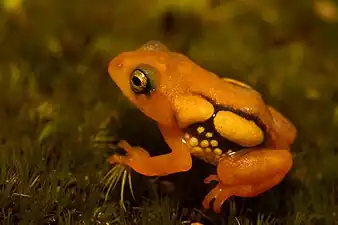Raorchestes resplendens
Raorchestes resplendens, the resplendent shrubfrog, is a critically endangered species of frog belonging to the family Rhacophoridae endemic to the high altitude region around the south Indian peak of Anaimudi.[3] It has extremely short limbs and numerous macroglands and was discovered from the Anamudi summit (2695 m asl) in the Western Ghats of Kerala, India and is known only from the Eravikulam National Park.[2][4]
| Raorchestes resplendens | |
|---|---|
 | |
| Scientific classification | |
| Domain: | Eukaryota |
| Kingdom: | Animalia |
| Phylum: | Chordata |
| Class: | Amphibia |
| Order: | Anura |
| Family: | Rhacophoridae |
| Genus: | Raorchestes |
| Species: | R. resplendens |
| Binomial name | |
| Raorchestes resplendens Biju, Shouche, Dubois, Dutta, and Bossuyt, 2010[2] | |
Description
Within the generally small Raorchestes, Raorchestes resplendens qualify as medium-sized frogs: males grow to a snout-vent length of 23–25 mm (0.91–0.98 in) and females to 25–28 mm (0.98–1.10 in). Individuals of the species are distinguishable from all members of the genus by their bright reddish orange colour and multiple prominent glandular swellings present laterally behind the eyes, on the side of the dorsum, on the anterior side of the vent, on the dorsal side of forearm and shanks and on the posterior side of the tarsus and metatarsus. The limbs are much shorter than in other Raorchestes. The iris is red.[2]
Distribution
The species was initially thought to live within three km2 on the Anamudi summit within the Eravikulam National Park, India[2] but researchers found another site about 20 km away within the same national park.[3][5]
Etymology and systematics
The genus Raorchestes is named in honour of C. R. Narayan Rao in recognition of his contribution to Indian batrachology. The scientific nomen Orchestes is based on the first generic nomen coined for frogs of the Philautus group, Orchestes Tschudi 1838. The specific epithet resplendens is a Latin term meaning 'bright coloured, glittering, resplendent' referring to the bright red or orange pigmentation.[2]
While Raorchestes resplendens are morphologically striking and different from other Raorchestes, molecular phylogenetics place them clearly within that genus. This suggests rapid morphological evolution in Raorchestes resplendens.[2]
Behaviour
Raorchestes resplendens have very short limbs, and the species is characterized by pronounced crawling behaviour. It is a ground-dwelling species,[2] while most Raorchestes are typically found on vegetation above the ground, some of them being arboreal.[6]
Raorchestes resplendens females burrow their eggs under the moss-covered forest floor, deep inside the base of bamboo clumps. As mature eggs were found in the oviduct of a female after oviposition, females of this species may mate with more than one male and breed more than once in a single season. Parents do not tend their eggs after oviposition. As is typical for the genus, development is direct, without a free-swimming larval stage. Hatching takes place after about 3–4 weeks. Upon hatching, froglets are fully mobile and measure about 4.5 mm (0.18 in) in snout-vent length.[2]
References
- IUCN SSC Amphibian Specialist Group (2011). "Raorchestes resplendens". IUCN Red List of Threatened Species. 2011: e.T189814A8772103. doi:10.2305/IUCN.UK.2011-1.RLTS.T189814A8772103.en. Retrieved 20 November 2021.
- Biju S.D.; Y. Shouche; A. Dubois; S. K. Dutta; F. Bossuyt (2010). "A ground-dwelling rhacophorid frog from the highest mountain peak of the Western Ghats of India" (PDF). Current Science. 98 (8): 1119–1125.
- Frost, Darrel R. (2016). "Raorchestes resplendens Biju, Shouche, Dubois, Dutta, and Bossuyt, 2010". Amphibian Species of the World: an Online Reference. Version 6.0. American Museum of Natural History. Retrieved 25 August 2016.
- "New species of frog found in Eravikulam National Park". The Hindu. 5 May 2010. Retrieved 15 May 2010.

- Joseph, Jobin; Jobin, K.M.; Nameer, P.O. (2012). "Additional record of Resplendent Bush Frog Raorchestes resplendens (Anura: Rhacophoridae) from the Western Ghats, India". Journal of Threatened Taxa. 4 (11): 3082–3084. doi:10.11609/JoTT.o3214.3082-4.
- Biju, S. D.; Bossuyt, F. (2009). "Systematics and phylogeny of Philautus Gistel, 1848 (Anura, Rhacophoridae) in the Western Ghats of India, with descriptions of 12 new species". Zoological Journal of the Linnean Society. 155 (2): 374–444. doi:10.1111/j.1096-3642.2008.00466.x.
External links
 Data related to Raorchestes resplendens at Wikispecies
Data related to Raorchestes resplendens at Wikispecies
